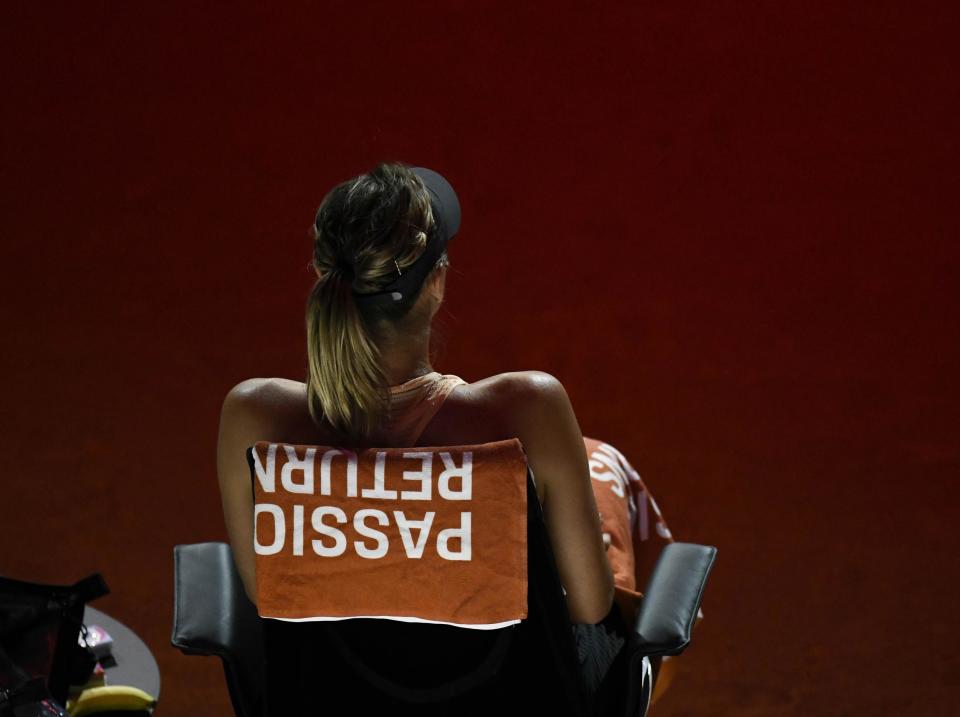One year on from her comeback, Maria Sharapova is no nearer to achieving her goal of another Grand Slam

Remember all the fuss when the Porsche Tennis Grand Prix granted Maria Sharapova a wild card here last year on her return to competition after serving a 15-month ban for a drugs offence? The 31-year-old Russian was back at the tournament this week, courtesy of another wild card, but her return has created barely a ripple - and lasted only one match.
Sharapova’s 3-6, 7-6, 6-4 defeat on Tuesday to France’s Caroline Garcia, who had lost all four of their previous meetings, was the latest disappointment in an underwhelming comeback by a player who has won all four Grand Slam titles in her career, topped the world rankings and earned more money than any other female athlete in history.
Having been repeatedly troubled by injuries since making her return, the world No 41 has now lost all three matches she has played since the Australian Open in January and could drop out of the top 50 in next week’s updated rankings list.
Despite her troubles, however, Sharapova continues to believe that she can win Grand Slam titles. “I think when you’ve been in that position and you’ve been able to produce that type of tennis there’s definitely memories of that and that’s what you work towards,” she said after this latest defeat.
“I’ve said a few times that I think it would be silly if my ultimate goal for the next 12 months or the next two years would be to win a smaller event, even though that’s good preparation and you want to be holding trophies no matter what size they are and where they are in the world.”
Sharapova had her chances against Garcia, who had looked nervous at the start and lost the first set on a single break of serve after double-faulting in the second game. The world No 7 also went a break down at the start of the deciding set but levelled at 2-2, broke again to lead 5-4 and served out for victory after two hours and 44 minutes.
When Sharapova started her comeback last year she reached the semi-finals here, but her fortunes took a turn for the worse when the French Open decided – unlike a number of other tournaments - not to award her a wild card. A subsequent thigh injury meant she would not have been able to play at Roland Garros anyway and led to her missing the entire grass-court season.
Another injury, this time to her left arm, forced Sharapova out of build-up events before the US Open, though she enjoyed a good run at Flushing Meadows, where she beat Simona Halep, then the world No 2, before losing in the fourth round to Anastasija Sevastova. In October she won her first title for more than two years in a minor event in China.
This year, however, Sharapova has struggled again. After withdrawing from last month’s Miami Open because of more problems with her arm she parted company with Sven Groeneveld, her coach for the last four years, and re-hired Thomas Hogstedt.
Sharapova hinted that a disagreement with Groeneveld over playing in Indian Wells last month had been behind their split. “I felt it wasn’t maybe a match that I needed to go and play because I wasn’t physically ready,” she said. “Maybe that match helped me make some tough decisions.”
The Russian, whose next tournament will be in Madrid in two weeks’ time, has no formal agreement with Hogstedt – “We’re just taking it one week at a time” – but said she admired the Swede’s work ethic. “I’m not shy of putting in the work,” she said. “I expect that from myself because as the competition gets tougher and the years go by everyone’s putting in the work.”
Asked why she thought she had suffered so many physical issues in the last 12 months, Sharapova said: “Looking back to almost a year ago, I played three events in a row and I don’t think my body was necessarily ready for that type of level. I had a pretty tough injury to get through and I missed a Grand Slam after that. It took five or six weeks of recovery. I think it’s a combination of a few things, but definitely something I have to be a little smarter about looking into the future.”
She added: “I haven’t played many tournaments since I came back and that’s just the reality of it. It’s always great when you’re playing matches and winning matches, but then maybe at a certain point you need to let your body rest.
“I want that matchplay, but obviously coming off of losing a match like this doesn’t necessarily give you those matches for the next 10 or 11 days until the beginning of Madrid, so that’s always a little bit of a tricky situation. I think [I need] to listen to my body a little bit better, maybe not go into matchplay when I’m just not ready and not be so stubborn.”
Barring injuries, Sharapova will play in Britain for the first time for three years this summer. She is already included in the field for the Nature Valley Classic at Edgbaston, where she last played in 2010.
However, it will be her performances in the biggest tournaments that will determine her long-term future. If she felt she was not capable of winning Grand Slam titles again, The Independent asked her here, would that be a time to retire? “That’s right,” she said. “You’re spot on.”

 Yahoo Sport
Yahoo Sport 





































